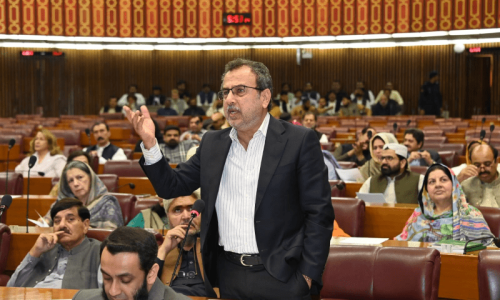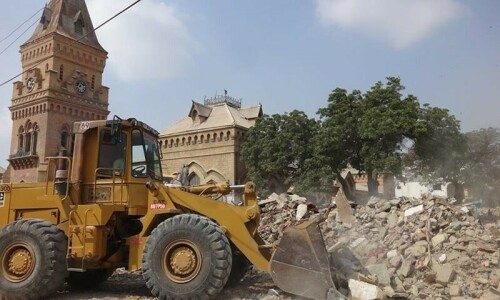KARACHI: The Federal Ministry of National Health Services on Thursday notified that the three major hospitals in Karachi had been returned to the Centre as indicated in a Supreme Court judgement. The step by the federal government was condemned by the chairman of the Pakistan Peoples Party, which rules Sindh.
A notification has been issued by the Ministry of National Health Services, Regulations and Coordination, which says that in pursuance of the Supreme Court of Pakistan’s judgement dated Jan 1, 2019 in pleas and on “having been approved by the federal cabinet on April 2, 2019”, those three hospitals or medical institutions “are hereby restored to the federal government”.
It said the hospitals — Jinnah Postgraduate Medical Centre, Karachi, National Institute of Cardiovascular Diseases, Karachi, and National Institute of Child Health, Karachi — had been placed under the administrative control of the Ministry of National Health Services, Regulations and Coordination, Islamabad, with its components, assets and staff as indicated in the Supreme Court decision.
Bilawal terms it an attack on provincial autonomy, warns of resistance
“Necessary amendments in the Rules of Business, 1973, will be placed to the Cabinet Division,” it added.
‘Attack on provincial autonomy’
PPP chairman Bilawal Bhutto-Zardari “strongly condemned” the taking over of the three key hospitals of Sindh by the federal government and termed it “an attack on the hard-earned provincial autonomy”.
In a statement, the PPP chairman said the people of Sindh had invested billions of rupees in the revolutionary improvements in the JPMC, NICVD and the NICH after those hospitals had been handed over to the province under the 18th Amendment in the Constitution.
“Expansion of NICVD hospitals to several cities of the province has excelled performance of the Sindh government, which paid for expensive cardiac treatments of patients from all over Pakistan,” he added.
Mr Bhutto-Zardari said taking over those important health infrastructures without waiting for the final verdict of the Supreme Court on a review petition filed by the Sindh government “has displayed the arrogance of the federal government and a challenging contempt of the supreme judiciary by the government of Pakistan Tehree-i-Insaf”.
“An admission by the NAB [National Accountability Bureau] chairman that he is holding back inquiries of corruption against the government ministers to stop its imminent fall and the PTI government’s contempt of court action have exposed the constitutional crisis that the country is currently facing,” the PPP chairman said.
He said the PPP’s Sindh government was spending Rs12.5 billion on the NICVD and Rs4bn on the JPMC annually to ensure quality free of cost treatment to patients coming from across Pakistan.
“The Sindh government has been providing state-of-the-art health facilities to people who come from every corner of the country without any charges.”
Bilawal Bhutto-Zardari warned that his party and the people of Sindh would not allow anyone to usurp the hard-earned assets of the health facilities.
“Resistance will be mounted at every available forum,” he said, warning the federal government to get the notification withdrawn before public outrage against its highly controversial decision got momentum.
The provincial government, however, had created its own Sindh Institute of Cardiovascular Diseases after the apex court’s decision.
A bill passed to that effect said the SICVD was meant to run all the satellite facilities and chest pain units of the NICVD.
Chief Minister Syed Murad Ali Shah had then said that those satellite facilities in various cities of Sindh and chest pain units in Karachi had been set up by the Sindh government and had been handed to the NICVD under a memorandum of understanding, which could be scraped at any moment.
The headquarters of the SICVD would be established in Sukkur or Karachi.
Mr Shah had said that health had been a provincial subject since 1935 and the NICVD, JPMC and NICH had been the ones that had been established by the government when the then undivided country’s west wing, which now represented whole Pakistan, was named West Pakistan by jumbling the four provinces here.
He had said that since then there were no provinces, these hospitals were established and run by the federal government; however, immediately after the 18th Amendment was passed, the federal government itself handed them over to the province.
Published in Dawn, May 24th, 2019















































